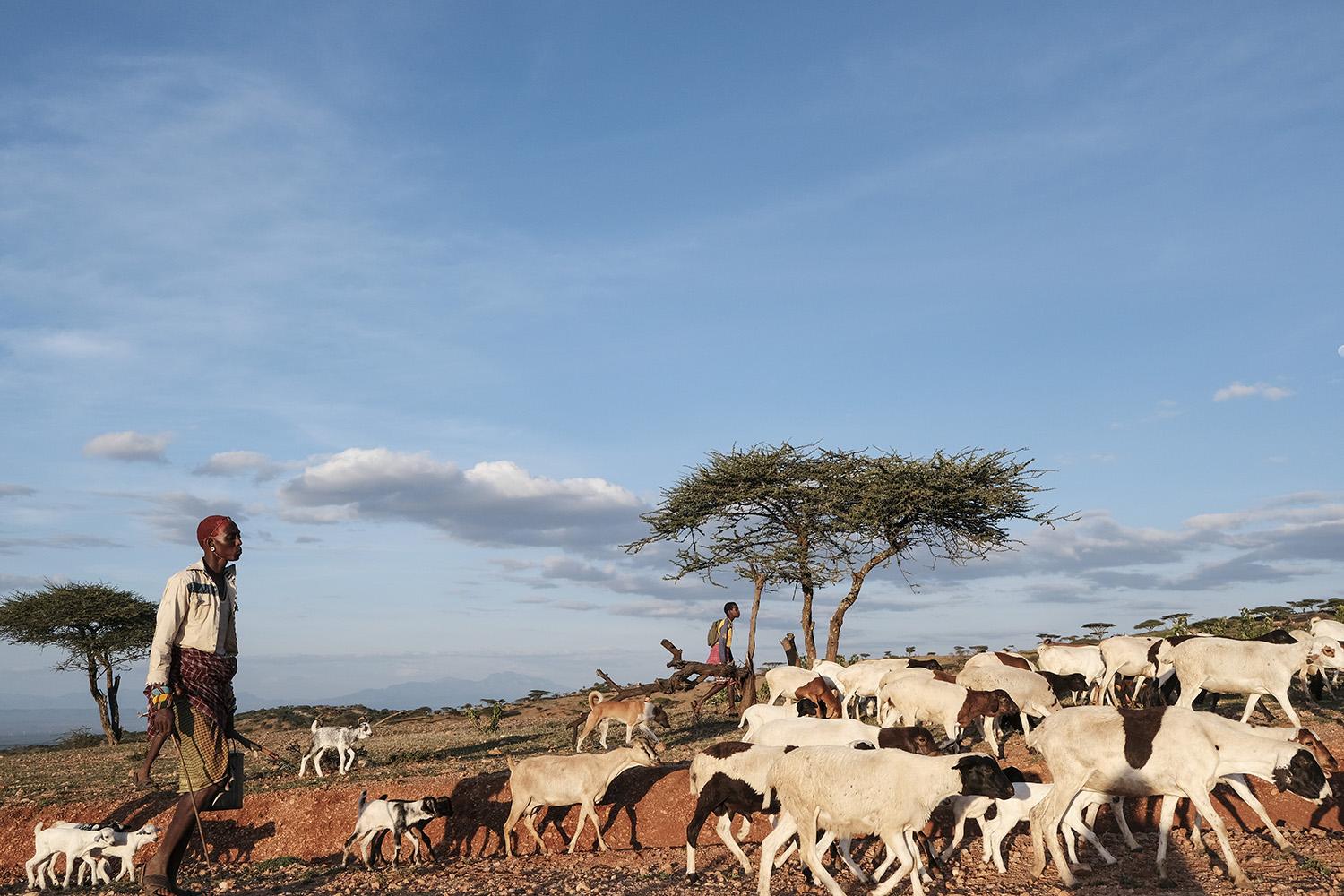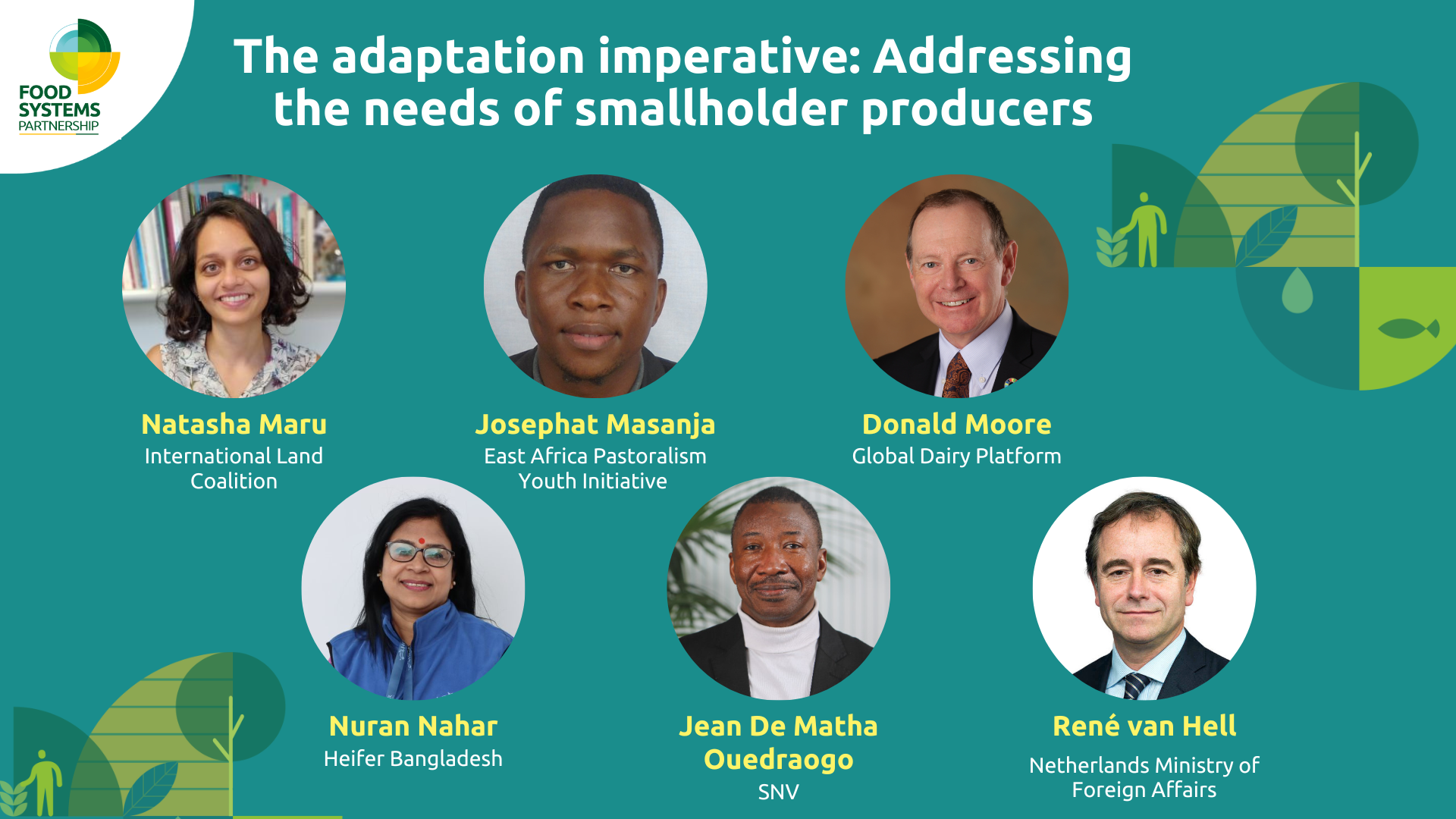
The adaptation imperative: Addressing the needs of smallholder producers - 6 Dec
Core message
Event summary
At the 'Adaptation Imperative' session during COP28 on 6 December, held at the Food Systems Pavilion, speakers emphasized the urgent need for increased investment in climate adaptation innovations. Specifically, they focused on how these efforts could benefit smallholder producers, not only in adapting to climate change but also in enhancing their livelihoods and contributing to broader mitigation efforts.
The session illustrated why livestock should be an important element of these investments: the livestock sector employs more than 1.3 billion people worldwide, while an estimated 600 million of the world’s smallholder farming households in developing countries earn their living primarily from livestock.
Presenters sought to expand the mitigation-heavy focus of COP28 to include discussions around adaptation efforts that are yielding results for livestock producers from West Africa, East Africa and India. Attendees listened to practical solutions from implementors like Heifer Bangladesh, SNV, the International Land Coalition and the Global Dairy Platform, and heard about investment priorities from the Netherlands, from agricultural innovations and to a lesser extent, loss and damages from climate change impacts.
Pastoralist youth leader, Josephat Masanja from Tanzania, provided insights from the user and innovator perspective, describing how pastoral communities are already innovating to adapt to climate change, but still require financial and policy support to safeguard the mobility that is the cornerstone of pastoralist resilience.
The session demonstrated how well-crafted adaptation strategies not only bolster the resilience of smallholder livestock systems but also yield co-benefits, including climate change mitigation and improved livelihoods for farmers and other value chain actors.

Key takeaways
- There is a pressing need to adapt to climate change impacts and implement good agricultural practices to improve productivity and reduce emissions. Smallholder producers are already innovating within their communities and these efforts must be supported and scaled out. Farmer-led scaling approaches are an effective means to enhance adoption rates.
‘Heifer Bangladesh is supporting about 6000 women members in localized and people-led cooperatives that are also selling services to their communities. Our focus is on building the capacities of these cooperatives so that they can become changemakers in their communities and take the lead in addressing climate-related disasters. We are seeing farmers take their own initiatives and are not waiting for others to support them.’ – Nurun Nahar, Heifer Bangladesh
- Capacity building was a recurring theme, with panelists calling for greater support for farmers to adopt new technologies and ensure their inclusion in decision-making processes.
‘The key to helping farmers, livestock breeders and pastoralists to adopt new practices is through capacity building. This includes investing in their ability to take protective measures to cope with climatic shocks and to make adjustments that help them to adapt to the impacts of climate change. When farmers implement new practices, this increased knowledge also contributes to increased resilience.’ – Jean De Matha Ouedraogo, SNV
- Conserving the mobility and land rights of pastoralist communities is central to safeguarding their livelihoods and enhancing the resilience of pastoralists.
- Investments and use of cutting-edge technologies to foster livestock’s role in livelihoods and economic growth are essential in livestock-specific and wider development policies/agendas.
What panelists had to say
‘In Tanzania, we implemented pilot programs focused on nutrition. To do this, we had to work at the farm level to improve productivity. A year after implementing our pilots, we revisited the progress and found remarkable improvements: the yield per cow went up by 25%, farmer income increased by 29%, and food loss between farm and processing dropped from 7% to 2%. By enhancing productivity, we also improved emissions intensity by 18%. If we can implement good practices everywhere, there's a 40% reduction potential in emissions. By elevating the performance of low performers, we can remove a significant portion of emissions.’ – Donald Moore, Global Dairy Platform
--
‘Mobility is the central adaptive activity of pastoralists that ensure the health and well-being of their environment. Pastoralists provide ecosystem benefits derived from their experiential knowledge of their environments and access to resources, which can support their future adaptation… What we need are policy frameworks and policies that are inclusive and that accommodate pastoral systems and their own adaptation mechanisms. Pastoralists also need capacity support to ensure that they are involved in decision-making processes.’ – Natasha Maru, International Land Coalition
--
‘Pastoralists in Western India graze their livestock on grasses during the monsoon (rainy) season and move to sub-humid regions in summer, allowing land regeneration and year-round productivity. They have innovated through social institutions, livestock breeds and invested in relationships to sustain this system. However, pastoralists face challenges like extreme weather and land appropriation for agriculture and industries. A big part of our work focuses on securing land rights for pastoralists to sustain their livelihoods and knowledge systems.’ – Nurun Nahar, Heifer Bangladesh
--
‘Many pastoralists in our community are conscious of the environmental implications of livestock. They're implementing local technologies, like constructing deep washes to control external parasites. They also apply climate mobility strategies; during the rainy season, they feed animals in their native areas and shift to other areas at different times… It's important to embrace the ICT (information, collaboration, and transformation) approach. Integrating the traditional knowledge of pastoral communities with modern technology is crucial. We should balance sustainability and innovation while respecting cultural heritage, like the Masai who value their culture.’ – Josephat Masanja, East Africa Pastoralism Youth Initiative
--
'We recognize the complexity in accessing global climate financing and even as shareholders of the World Bank and members of the Green Climate Fund's council, we are frustrated by the slow processes. This situation highlights the crucial need for efficient allocation of funds... My experience living in Amsterdam has taught me the value of specific local knowledge. This reality emphasizes the importance of 'locally led development', where decisions are guided by those with indigenous knowledge and expertise in their own communities.' – by René van Hell, Netherlands Ministry of Foreign Affairs
Looking Forward
Post COP28's 'Adaptation Imperative' session, greater focus should be made on supporting smallholder producers with investments and capacity building. Embracing innovative agricultural practices and including smallholder and pastoral communities in policy-making are essential for enhancing climate resilience, mitigating impacts,and improving livelihoods globally.
Watch the session recording on YouTube